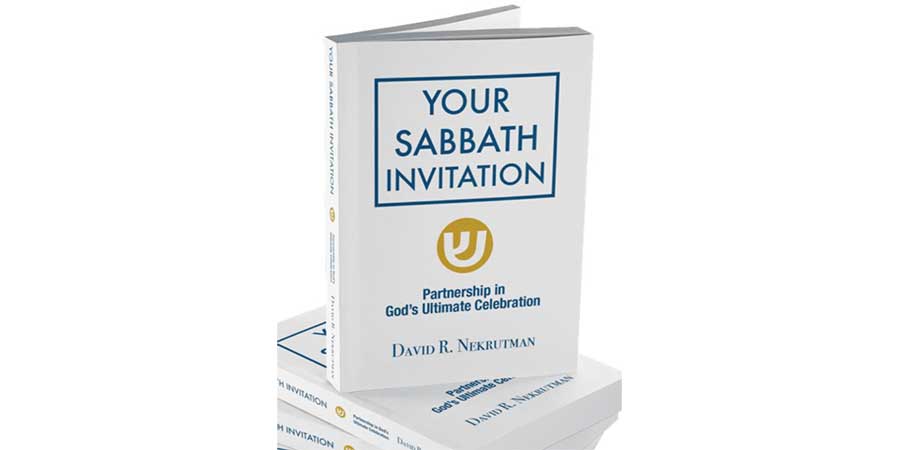A Review of Your Sabbath Invitation: Partnership in God’s Ultimate Celebration
By David R. Nekrutman
Reviewed by Albert J. McCarn
The Sabbath is a sensitive subject that has divided Christians and Jews for centuries, but it doesn’t have to be that way. That’s what David Nekrutman demonstrates in his book, “Your Sabbath Invitation: Partnership in God’s Ultimate Celebration“.
As an Orthodox Jew who has worked to improve Jewish-Christian relations for many years, Nekrutman has a passion for sharing Hebraic biblical insights with Christians in the interest of deepening their understanding of the scriptures. His outreach coincides with the Torah Awakening among Christians that has inspired a movement toward observance of the seventh day Sabbath (Shabbat in Hebrew), and other biblical celebrations like Passover. These holy times do have meaning for Christians, especially since Jesus (Yeshua) and his followers observed them. That is why Christians of all denominations will find Your Sabbath Invitation a valuable resource in their journey toward deeper understanding of God’s Word and His ways.
Nekrutman wrote Your Sabbath Invitation to achieve three main objectives:
- To equip individuals who want to deepen their relationship with God, largely persons with a biblical, Judeo-Christian worldview – especially Bible-believing Christians.
- To help readers soak in the Amplified Presence of God by observing the Sabbath and fulfilling their partnership with God.
- To empower readers to decipher and interpret Scripture in a Hebraic way.
He hits the mark with each objective, starting with an explanation of why Sabbath observance applies not only to Jews and Christians, but to the entire world. His explanation centers on the last verse of Isaiah:
“’And it will be that from New Moon to New Moon, from Shabbat to Shabbat, all of humanity will worship before Me,’ says The Eternal.”
Isaiah 66:23 (Author’s translation)
This verse is part of Isaiah’s description of the Messianic Age, which makes it part of End Times prophecy. Nekrutman notes that Christian eschatology emphasizes the judgments of God and the return of Christ (Messiah), but do not mention global observance of Shabbat. He attributes this to the different Jewish and Christians views of Sabbath. His goal is not to persuade Christians to convert to Judaism or adopt Jewish customs for Sabbath observance, but “to view Sabbath as an attractive integral part of a godly lifestyle” (Your Sabbath Invitation, p. 9). If we accept God’s word that Sabbath observance will be a universal aspect of worshiping Him in the age to come, then Nekrutman’s goal becomes a starting point for understanding how we will live in a world governed directly by God through His Messiah.
In his fast-paced exploration of Shabbat, Nekrutman emphasizes what it is and why it is observed before presenting some customary ways Jews keep Shabbat. Along the way, he presents key Hebraic concepts for mining revelation from scripture. This is where he indirectly addresses some of the challenges to Christian-Jewish understanding and cooperation. Language is one issue. Observant Jews know Hebrew, and have an advantage over the average Christian who studies the Bible in translation. Extensive knowledge of Biblical Hebrew isn’t required for excavating the levels of meaning in the scriptures, but it helps. Nekrutman presents examples by using his translations, as well as explanations of Hebrew terms, such as Shabbat, that have no simple equivalents in English because they are so packed with meaning. This is how he demonstrates the value of investigating Hebrew terms to add depth to our biblical understanding, and to our relationship with the Almighty Who authored the Bible.
Your Sabbath Invitation is full of instruction on how to ask questions in the Hebraic way. The author draws on millennia of Jewish learning, explaining concepts and practices in ways that demystify the Jewish approach to biblical studies to Christian readers. He accomplishes this in a non-confrontational way that sheds light on Jewish concepts, such as Torah. Christians are conditioned to regard Torah as Law, but Nekrutman offers a preferred definition of Torah as “instructions.” As he explains,
Torah refers to the Five Books of Moses (the Pentateuch); to the entire written and canonized Hebrew Bible; to God’s requirements, laws, and commandments in general; or to specific Scriptures. Context determines which definition applies. (Your Sabbath Invitation, p. 278)
This definition of Torah provides a framework for Nekrutman’s investigation of Shabbat. Through linguistic analysis and examples from Jewish biblical commentary, he demonstrates the centrality of Shabbat in God’s estimation. Because God Himself has always looked toward Shabbat as His sacred time to be with His human creations, Jews have responded over the ages to anticipate and prepare for Shabbat in expectation of meeting with God at His appointed time. Shabbat, therefore, is not a legalistic requirement, but a holy time of renewal in God’s Presence.
It’s hard to overemphasize the importance of what David Nekrutman has done in Your Sabbath Invitation. As an Orthodox Jew who knows how Christians approach the Bible and the God of the Bible, he is able to interpret Jewish concepts and culture in ways Christians can receive easily. He has opened to Christians the world of Hebraic scholarship that previously has been mystifying, and perhaps even a little scary. What the reader learns is that the world of Jewish biblical studies is filled with concepts and analyses that complement and enhance our Christian approach to the Bible. By drawing back the curtain on the richness of Jewish biblical understanding, David Nekrutman not only invites us to investigate the Sabbath, but to embark on a Hebraic journey toward a more complete expression of our Christian faith.
Your Sabbath Invitation: Partnership in God’s Ultimate Celebration is available at https://www.yoursabbathinvitation.com/.








